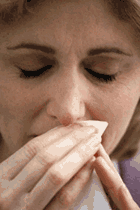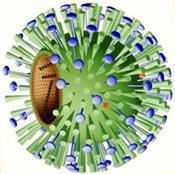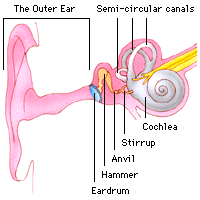Cold Regimen
 Summary: Use large amounts of echinacea as soon as possible at the onset. Use high or very high dose Vitamin
C. Perform The
Water Cure. Do Nasal
Washes as necessary. Use colloidal silver as eyedrops and
to rinse mouth. Put 3% Hydrogen Peroxide in ears.
Summary: Use large amounts of echinacea as soon as possible at the onset. Use high or very high dose Vitamin
C. Perform The
Water Cure. Do Nasal
Washes as necessary. Use colloidal silver as eyedrops and
to rinse mouth. Put 3% Hydrogen Peroxide in ears.
Echinacea should be used in high dose, like 10g, as soon as possible at the onset followed by 3g at least three times per day. Once the symptoms of an acute viral infection like this appear, the virus is producing an enzyme which allows it to invade additional cells more easily. Even if the virus is stopped, once the cells are destroyed it can still take days to recover from the damage. Echinacea stops the damage by deactivating the enzyme, which is why it is so important to take it immediately at the first sign of a cold. Vitamin C in high dose will also help prevent the damage from the enzyme plus fight the virus. The Water Cure is used to fully hydrate the body to make fighting the virus and removing its debris much easier.
The most common means of infection is not from sneezing or coughing, or walking barefoot in the rain, but from hand-to-hand contact. That is why washing your hands frequently when you have a cold is so important.
To use Vitamin C in sufficient dose, it is best to start with a whole teaspoon (4 to 5g) followed with a gram or two every waking hour afterward until symptoms subside. Other supplements in the Antiviral General regimen will speed results. For colds, a good type of vitamin C to use is Alacer Emergen-C, which is packets of vitamin C and minerals plus some vitamins. Packets can be easily carried around for use during the day. Emergen-C contains a good bit of vitamin B12, so should NOT be taken in the evening, although this pick-me-up may be welcome during the day when suffering cold symptoms.
Colloidal
Silver is a good thing to have around in case a cold strikes. It can
be taken in high dose. Always mix in water for best results. But, it is most helpful during a cold used
as an agent to disinfect the nose and eyes. Put in a nasal spray bottle if
available and keep the nasal passages moist with it. This can also be done
with a dropper but it is much more effective to reach the nasal passages if it
is misted and inhaled. Put a few drops in each eye, too, but for this
purpose, it must be fresh and made to the highest standards (no salt or other
contaminants, using only distilled water which is  heated to at least close to
boiling, and with perfectly hygienic methods of bottling and dispensing).
To disinfect the ears, a few drops of 3% hydrogen peroxide are added to an ear.
Let sit against the eardrum for a few minutes, ideally 10 or until bubbling
stops. Drain and
repeat for other ear.
heated to at least close to
boiling, and with perfectly hygienic methods of bottling and dispensing).
To disinfect the ears, a few drops of 3% hydrogen peroxide are added to an ear.
Let sit against the eardrum for a few minutes, ideally 10 or until bubbling
stops. Drain and
repeat for other ear.
If there is still any nasal or lung congestion after a few hours of this regimen, consider using an ephedra supplement like Enzymatic Therapy SinuCheck at half or less recommended dosage or as needed up to recommended dosage. Use only until symptoms are controlled. Do not use ephedra products long term.
A classic naturopathic remedy for colds is to crush a medium clove of garlic with a similar sized piece of ginger (shave or crush), add the juice of one lemon, and mix in warm water to disperse. Drink three cups per day until the cold is gone. This is a good treatment for virtually all viral or bacterial illness. Add thyme (1t of dried leaf 3x day) to this concoction (or take separately) to speed effects or if congestion is severe. Honey can be added to taste, and this usually improves the effects on colds, too. This is one of the best cold remedies of all time, but many will not use it due to the hassle involved, and the taste. The taste is, surprisingly, not too bad, especially when honey is added, since the ginger and lemon take the edge off the garlic.
Hydrogen peroxide in the ears for the flu and colds? 
Although it would appear to contradict what we are taught about the flu and colds, many people have tried hydrogen peroxyde in the ears with great success. Hydrogen peroxide works quite well and is supposed to be effective about 4 times out of 5, especially if done when the symptoms first appear. In 1928 Dr. Richard Simmons hypothesized that colds and flu virus enter our bodies through the ear canal. It was Dr. Simmons' hypothesis that, contrary to what we have been taught, we usually can catch the two via the ear canal and not through the eyes or nose or mouth as most of us believe. Dr. Simmons' findings were dismissed by the medical community. Remarkable results can be achieved in curing colds and the flu within 12-14 hours when we administer a few drops of 3% Hydrogen Peroxide (H2O2) into each ear. The H2O2 starts working within 2-3 minutes in killing the cold or flu. There will be some bubbling and in some cases mild stinging might occur. I do this myself and I can assure you that it is not painful in any way. It tickles more than anything. Wait until the bubbling subsides - usually a few minutes - then drain onto a tissue and repeat with the other ear. Although this practice is perfectly safe for infants and children to use, the loud bubbling and stinging may frighten them, and they will need someone they trust to put the hydrogen peroxide in their ears. DO NOT get hydrogen peroxide in the eyes - if you do, flush with water. |
Rife Frequencies, Annotations, and Comments CAFL - Various frequency sets for general colds. Also see specific viruses which can cause it. Cold_1 (use 800 and 880 for 10 min, others for 5 min) - 5500, 4400, 802, 787, 727, 720, 552, 440, 400, 125, 72, 800, 880 TrueRife - Selected frequency sets in F100 format with comments Cold_and_Flu #25 minutes #A cold virus is deposited into the front of the nasal passages by contaminated fingers or by droplets from coughs and sneezes. (7) Small doses of virus (1-30 particles) are sufficient to produce infection. (8, 9) #The virus is then transported to the back of the nose and onto the adenoid area by the nose itself! #From the time a cold virus enters the nose, it takes 8-12 hours for the viral reproductive cycle to be completed and for new cold virus to be released in nasal secretions. This interval is called the incubation period. #Cold symptoms can also begin shortly after virus is first produced in the nose (10-12 hours). The time from the beginning of the infection to the peak of symptoms is typically 36-72 hours. duty 71.5 # This set runs freqs for 5 minutes, then two for dwell 180 870, 821, 776, 465, 250 dwell 300 870, 776 Cold_and_Flu_Oncoming #25 minutes #A cold virus is deposited into the front of the nasal passages by contaminated fingers or by droplets from coughs and sneezes. (7) Small doses of virus (1-30 particles) are sufficient to produce infection. (8, 9) #The virus is then transported to the back of the nose and onto the adenoid area by the nose itself! #From the time a cold virus enters the nose, it takes 8-12 hours for the viral reproductive cycle to be completed and for new cold virus to be released in nasal secretions. This interval is called the incubation period. #Cold symptoms can also begin shortly after virus is first produced in the nose (10-12 hours). The time from the beginning of the infection to the peak of symptoms is typically 36-72 hours. duty 71.5 # This set runs freqs for 5 minutes, then two for dwell 180 870, 821, 776, 465, 250 dwell 300 870, 776 |
Links |